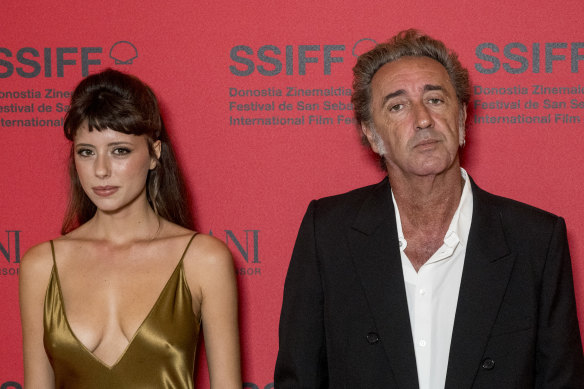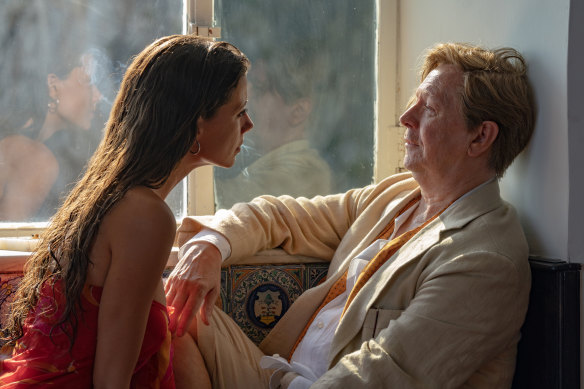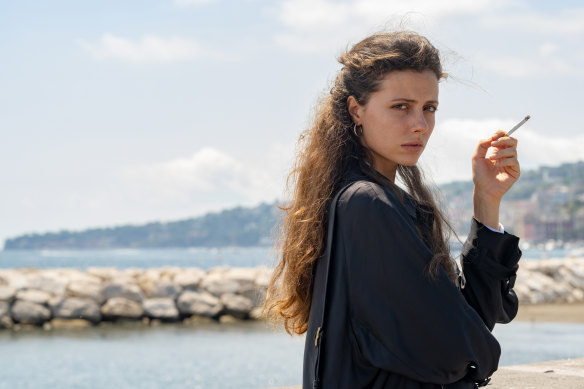
A single trauma was filmmaker Paolo Sorrentino’s gateway to adult life. At 16, he ducked joining his parents on holiday in the mountains so he could see footballer Diego Maradona play a home game. While he was watching football, Carlo and Anna Sorrentino died in their mountain cabin from a carbon monoxide leak. Sorrentino was orphaned overnight. In a sense, as he later reflected, he owed the Argentinian forward his life.
It’s little surprise, then, that all of his films are in part about death. “I couldn’t make a film without touching on such an important issue,” he has said. “For human conditions, there are five issues that are key. Death is one of them.” And the others? “Family, eroticism, happiness and loneliness.”
He was talking then about his memoir film, The Hand of God (2021), which weaves a reflection on his youthful adoration for Maradona into his own story of becoming a filmmaker. His new film, Parthenope, centres on a ravishing young woman’s passage from youthful indolence to maturity. Her family is rich; she lives by the sun-spangled sea, where she lounges on the terrace, desired by all who see her. Ostensibly, it is a film about beauty. “But it’s not beauty I’m really interested in,” says Sorrentino. “I’m interested in trauma.”

Paolo Sorrentino with Parthenope star Celeste Dalla Porta at this year’s San Sebastian Film Festival. Credit: WireImage
Shocking deaths are often slipped between the shiny surfaces of Sorrentino’s films; even in his TV series, The New Pope (2020), Jude Law’s Lenny has lost his parents when young. In Parthenope, a sudden bereavement is the story’s hinge. After a loved one dies, the titular character retains her habitual frivolity and willingness to be amused by the foibles of others, but she lives under the shadow of death – a death that she believes was largely her fault.
The story is prefaced by Parthenope’s birth in the 1950s, before skipping to 1973, when she is 18. The young woman is played by newcomer Celeste Dalla Porta, a recent film school graduate who had previously made only short films. “In her personality traits, I can see the liberty of youth and a certain subterranean sorrow … of which she is unaware,” Sorrentino says. “This is why I thought she was going to be the right person.” She is also startlingly beautiful.
Dalla Porta proves incisive and much brisker than her achingly languid character; she gives short shrift to a suggestion that she will henceforth be branded by her looks. “Parthenope is beautiful because people look at her and see her as beautiful,” she says. “I think beauty is something subjective.”
Among her admirers is American modernist writer John Cheever, played in a brief but crucial depiction of crumbling masculinity by Gary Oldman. Cheever famously drank himself to death in 1982; Oldman, now 27 years sober, was once on the same path.

Celeste Dalla Porta and Gary Oldman in Parthenope. Credit: Gianni Fiorito
At first, Oldman says, he was concerned to find out how Cheever looked and spoke. “But then you read the script and speak with Paolo and soon realise it’s a big, romantic, flawed, melancholy construction of a writer, not a biography.” Exceptionally for this Sorrentino archetype, however, he soon fades from view; his parting shot to Parthenope is that he doesn’t want to steal a minute of her youth.
Loading
In their earliest discussions, Dalla Porta remembers, Sorrentino talked to her about her character’s mystery. “That she is a woman difficult to grasp, difficult to see through and difficult to control. This was what Paolo kept saying.” He also talked a good deal about Naples.
Naples was originally called Parthenope after one of the sirens in the Odyssey, who killed herself when Odysseus rejected her. According to legend, her body was washed up on the nearby shore. The Greeks rebuilt and renamed the city Neapolis – New City – in the 5th century BC, but the tragic siren is still remembered.
Parthenope’s mother delivers her in the sea as the whole neighbourhood looks on from the quay. She is named by her father’s boss, who unilaterally declares: “Her name is Parthenope!” Such are the local workings of power and obligation.
Sorrentino, 54, lives in Rome, but Naples remains the cradle of his imaginative world. “There is a sort of embodiment between the character of Parthenope and Naples,” he says. “They are both very seductive; they are in the spotlight but nonetheless they are hiding themselves.” Most importantly, however, the girl, Parthenope, is a sea creature, not only born in water but often seen emerging from it like a young Venus.
“This is the cinematic image I wanted to convey and I consider it extremely powerful,” says Sorrentino. “It is also linked to the fact that as Neapolitans, we have a very strong connection with the sea.”
Sorrentino’s films are notable for their lush extravagance; his settings and the gorgeous people who adorn them are glamorous, sun-drenched and sybaritic. His central characters, however, tend to be old roues filled with regret for the things they have failed to achieve, usually embodied by the great Tony Servillo; The Great Beauty, which won an Oscar in 2014, was an international breakthrough for both the filmmaker and the actor.

Celeste Dalla Porta: “Parthenope is beautiful because people look at her and see her as beautiful.”Credit: Gianni Fiorito
Parthenope is Sorrentino’s first female protagonist – if a character seen largely through the filter of others’ desires can be said to be a protagonist. He sees her as something more, in fact: the classical heroine of a modern epic.
“The epic form always has a hero,” he says. “For me, this hero was a heroine. In an epic, there is always warfare and the war we are fighting nowadays is an interior fight. This is something women do better than men.”
Parthenope is also shown to be clever, even brilliant: an A-grade student in anthropology, singled out for nurture by her paternal professor, she will go on to become an academic herself. By the end of the film, played by Stefania Sandrelli, she is in her 60s, energised and fulfilled by the love of her students.
But as a young woman, her hidden depths worry the men around her. They often ask what she is thinking; she never tells them.
“For men, in fact, women are a mystery; that is also true for me,” says Sorrentino. “This is why they keep asking, ‘what are you thinking?’ They are scared, nine times out of 10, that they might be thinking of another man.” But it’s not a mystery he sets out to solve. “I always make movies about what I do not know. I made films about politics because I was not aware of politics [Il Divo, 2008; Loro, 2018]. I want to follow something and get to know its story.
Loading
“I don’t presume, at the end of the movie, to have understood it. I do not know women. I do not know men! But I do wonder about things. I ask questions.”
In this film, he says, he wanted to interrogate our relationship with time. “How it flows and how it changes us. And I believe women face change better than men. They do tackle it, do face it, while men remain in their childhoods, trying to avoid it.”
Is Sorrentino talking about himself? It is no use asking – he skirts direct questions – but perhaps, in his films, he always is.



